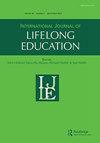深入研究终身学习的心理社会信念:跨教育水平的比较
IF 1.9
Q2 EDUCATION & EDUCATIONAL RESEARCH
引用次数: 1
摘要
摘要:受教育程度低的成年人通常不参与终身学习。目前的研究考察了不同教育水平的成年人对终身学习的心理社会信念是否以及如何不同。计划行为理论侧重于三种特定的心理社会信念(与感知的行为控制、感知的社会规范和态度有关),被用作理论框架。总共有563名成年人完成了我们的调查。方差分析用于研究组间差异。研究结果表明,除了控制力之外,低学历和中等学历成年人的心理社会障碍经历非常相似,因为中等学历成年人对参与所需的学习技能有更多的控制力。从统计数据来看,受过高等教育的成年人在终身学习方面承受着更大的社会压力,尤其是来自他们与工作相关的参照。此外,从统计数据来看,受过高等教育的成年人对自己的参与有更大的控制力,特别是在控制参与学习所需的技能方面。低学历和中等学历的成年人确实表现出积极的学习态度,但高学历成年人的态度在统计上更为积极。后续的定性研究可以深入了解这些决定因素。进一步了解这三个心理社会障碍可以帮助教育机构和政策制定者适当吸引和支持成年学习者。本文章由计算机程序翻译,如有差异,请以英文原文为准。
Delving into psychosocial beliefs about lifelong learning: a comparison across educational levels
ABSTRACT Low-educated adults do not often engage in lifelong learning. The current study examines whether and how psychosocial beliefs about lifelong learning differ between adults with different levels of educational attainment. The Theory of Planned Behaviour, which focuses on three specific psychosocial beliefs (related to Perceived Behavioural Control, Perceived Social Norms, and Attitudes) is used as a theoretical framework. In total, 563 adults completed our survey. ANOVA-analyses were used to study between-groups differences. The results demonstrated that low- and medium-educated adults’ experiences with psychosocial barriers are quite similar, except for power of control, since medium-educated adults experience more control over learning skills needed to participate. High-educated adults experience statistically significant more social pressure to engage in lifelong learning, especially from their work-related referents. In addition, high-educated adults experience statistically significant more control over their participation, specifically when it comes to control over skills necessary to participate in learning. Low-and medium-educated adults do show positive attitudes towards learning, but high-educated adults’ attitudes are statistically significant more positive. Follow-up, qualitative studies could provide in-depth insight into these determinants. Additional understanding of the three psychosocial barriers could help educational institutions and policy makers to appropriately attract and support adult learners.
求助全文
通过发布文献求助,成功后即可免费获取论文全文。
去求助
来源期刊

International Journal of Lifelong Education
EDUCATION & EDUCATIONAL RESEARCH-
CiteScore
3.10
自引率
27.80%
发文量
40
期刊介绍:
The International Journal of Lifelong Education provides a forum for debate on the principles and practice of lifelong, adult, continuing, recurrent and initial education and learning, whether in formal, institutional or informal settings. Common themes include social purpose in lifelong education, and sociological, policy and political studies of lifelong education. The journal recognises that research into lifelong learning needs to focus on the relationships between schooling, later learning, active citizenship and personal fulfilment, as well as the relationship between schooling, employability and economic development.
 求助内容:
求助内容: 应助结果提醒方式:
应助结果提醒方式:


